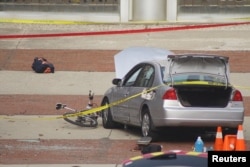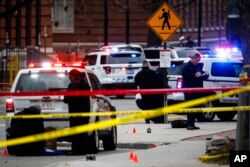Islamic State has claimed that Abdul Razak Ali Artan, the man who police say carried out a car-and-knife attack Monday at Ohio State University, was a "soldier of the caliphate" who was responding to calls to "target citizens of international coalition countries."
The statement was posted Tuesday on the militant group's Amaq news agency. IS has used similar, ambiguous wording after other attacks. U.S. authorities did not immediately comment on the claim.
Artan published a post on Facebook minutes before the attack in which he blamed America for killing Muslims abroad and praised al-Qaida cleric Anwar al-Awlaki as a hero, law enforcement officials told U.S. media outlets.
Authorities were still investigating Artan's motive in the attack at the campus in Columbus, but in his post he said he was willing to kill "a billion infidels" to stop America from "interfering with other countries."
"If you want us Muslims to stop carrying lone wolf attacks, then make peace," the post read. "By Allah, we will not let you sleep unless you give peace to the Muslims. You will not celebrate or enjoy any holiday."
Columbus Police Chief Kim Jacobs said terrorism was a possibility in the attack that saw Artan ram his car into a group of pedestrians and then get out and start stabbing people before being shot and killed by a police officer. Eleven people were injured during the attack, though no one was killed but Artan.
"Obviously with the purposeful intent that was noticed — driving on the sidewalk — we're going to look at it from the potential that it was planned," she said.
Artan, a Somali-born refugee, was living as a legal permanent resident in the U.S. and was a freshman business student at Ohio State.
Leaders from within the Columbus-area Muslim and Somali communities denounced the attack and said they were "heartbroken" by it.
Hassan Ali Omar, chairman of the Somali Community Association of Ohio, told VOA the Somalis he talked to were devastated to learn Artan was a Somali refugee.
"Some women told me they felt sick, they were heartbroken, they were shocked because they feel they have had enough troubles already," he said.
Omar was one of the community elders who last night visited the family of Artan. He said he met his mother and siblings and they told him they were feeling "at a loss and a lot of pain."
"They said he was hardworking person who loved education. They said their son had good culture and that they were not expecting that he would do this kind of act," he said.
There are nearly 60,000 students at Ohio State's main campus in Columbus. Those injured in the attack included both employees and students of the university.
During Monday's news conference, Jacobs referenced a previous terrorism case tied to Columbus — that of Abdirahman Sheik Mohamud, who was arrested in 2015 after returning from Syria. Mohamud, a naturalized U.S. citizen originally from Somalia, was charged with providing material support to terrorists.
In September, a Somali-American man stabbed 10 people at a mall in the northern state of Minnesota, before he was shot and killed by an off-duty police officer. Officials said the suspect asked some of his victims whether they were Muslim.
Columbus and Minneapolis host the largest Somali communities in the United States.
VOA Somali service's Harun Maruf and VOA National Security Correspondent Jeff Seldin contributed to this report.







